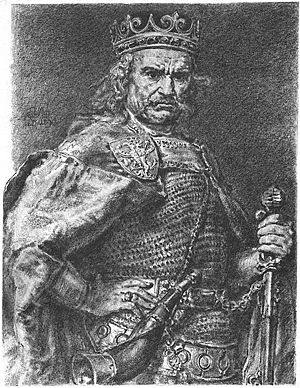Wladyslaw I of Poland facts for kids
Wladyslaw I of Poland (born 1261, died 1333) was a very important leader. He brought together different parts of Poland to create one strong country in the early 1300s.
Contents
Who Was Wladyslaw I?
Wladyslaw was likely born in 1261. His father was Duke Casimir of Kuyavia. He also had a step-brother named Duke Leszek the Black. People often called him Łokietek. This nickname meant 'the Short' or 'Elbow-high'.
At the time Wladyslaw was born, Poland was not one country. It was split into many smaller states, each with its own ruler. For many years, Wladyslaw worked hard to unite these lands. He wanted to make Poland a strong, single nation.
Wladyslaw's Challenges
Wladyslaw faced many challenges. He was often at war with the powerful King Wenceslaus II of Bohemia. His lands were also in danger from the Teutonic Knights. These knights were a strong military group who had taken control of the town of Gdańsk.
Despite these difficulties, Wladyslaw kept fighting. He managed to unite two big regions: Greater Poland and Lesser Poland. In 1320, he was crowned king. This was a huge step in bringing Poland back together.
Protecting His Country
Even after becoming king, Wladyslaw still had to defend his country. In 1331, when he was seventy years old, he won an important battle. He defeated the Teutonic Knights at a place called Płowce.
Wladyslaw I died two years later, in 1333. His only son, Casimir III of Poland, became the next king. Wladyslaw I was buried in the main church at Wawel Castle.
A Clever Test
During Wladyslaw's time, many Germans lived in Polish towns. Some of them went against Wladyslaw and caused trouble. After one such riot, Wladyslaw ordered his soldiers to make all Germans leave the town.
One soldier asked Wladyslaw how they could tell who was German. The king gave them a clever test. He told them to make everyone say these Polish words out loud: Soczewica, koło, miele, młyn. These words mean Lentil, wheel, grinds, mill. If someone could not say these words correctly, they were thought to be German.
Images for kids
 | Jessica Watkins |
 | Robert Henry Lawrence Jr. |
 | Mae Jemison |
 | Sian Proctor |
 | Guion Bluford |



